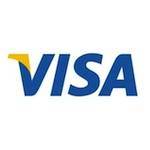Visa is beginning to make its move in the mobile payments space. While MasterCard has heavily featured its near field communications capabilities and exclusive partnership with the Google Wallet, Visa has been working behind the scenes to set up mobile payments strategy. Visa announced today that its payWave NFC mobile wallet application has been certified for a variety of smartphones giving the payments giant its first real steps into unleashing NFC wallets.

The Visa payWave certification is only coming to a limited of handsets at this point but the bigger news is the certification process itself. Visa is setting itself up to be a ubiquitous mobile payments option. As one of the leading payment processors in the world, this is a major step in the evolution of using smartphones for real world transactions.
There are only six phones in this newest round of Visa certifications. Users may be disappointed to find that four of them are BlackBerry devices (The Bold 9900, 9790 and Curve 9380, 9360). The Samsung Galaxy S II and LG Optimus NET were the other two smartphones included in the certification announcement.
This is an important step for Visa, its financial institution partners and the mobile industry,” said Bill Gajda, Global Head of Mobile Product at Visa in a press release. “In addition to issuing plastic magnetic stripe or chip-enabled payment cards, financial institutions can now consider offering their accountholders a way to transform their smartphones into fully functional mobile payment devices.”
Visa payWave is functional with many of the existing NFC point of sale terminals. The move to create the certification program and begin adding new devices at regular intervals should assuage the fears that many in the mobile payments industry believe will be major hindrance to adoption: fragmentation.
Payments are a fickle vertical. The world runs on money. At its base, the transferring of currency needs to be based on common standards agreed upon by the major operators. Visa and MasterCard have long agreed to be compatible while American Express and Discover are more frequently excluded. This has as much to do with infrastructure as it does with various fees and policies but the point stands.
When it comes to NFC, there are a lot of companies looking to make money with this new form of digital payments. It behooves the industry, from the payments processors to the technology companies, to work towards one basic standard. This means both hardware and software. For NFC to truly take off the act of tapping a phone to a point of sale terminal will need to be as simple and mindless as swiping a credit card. When all things are even, the various mobile wallet providers can differentiate themselves with partnerships and features within their particular apps.
Visa has made a step in the convergence of the technology and payments industries. It is a small, iterative step but an important one.




















